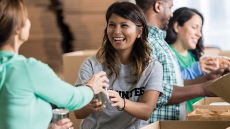A travel guide to help you for your next adventure!
Whether you are taking a gap year, going abroad to study or volunteer, or taking a break in between semesters to explore, travelling is the perfect way to discover new places and yourself. You will learn new skills such as navigating around and communicating with others, and the unexpected challenges that arise will help you grow as you learn to troubleshoot problems and rely on your strengths. All in all, travelling to new places opens your eyes to new cultures and societies, and provides a priceless amount of memories and valuable experiences. If you are travelling abroad for the first time, here is a simple guide that will help you get ready for your next adventure!
Step 1: Prepare your finances
Especially as students and youth, our budgets are normally extremely tight trying to afford school while living comfortably, and trying to save so we have security. Planning ahead of time is key! For example, if you want to head to Asia next summer, start doing research on how much it will cost for your trip (flight, accommodation, transportation, food) and make a monthly budget of what you will put away. You can start a separate savings bank account, and commit to having funds monthly transferred there automatically, so you can ensure you stay on track. Once you have enough funds and are ready for your trip, make sure you notify your bank on where you are travelling, get an extra ATM card (just in case you lose it or an ATM eats it up abroad), and bring cash with you, especially in the case of an emergency. You can change your money here locally so when you arrive abroad you already have some local currency, but it’s always a good tip to travel with USD cash too, so you can exchange it abroad when needed. Always check the country you are going to visit to see if there is a visa needed, and whether you need to apply beforehand, or can receive it and pay on arrival.
Step 2: Make sure your health and safety is covered
Visit your doctor so you can go over the medication and shots needed for your adventure. Make sure you do this in advance, so you have enough time to book your vaccination appointments, pick up your prescriptions, and submit your claims to your insurance companies. Honestly, when I was younger, I always thought flight insurance was too expensive, but we never know when life will unexpectedly surprise us. I was on my yearly trip to Africa for the school I built, and one of my family members ended up in the hospital back here in Canada – if I would have had travel insurance at that time, it would have made the entire process less stressful. Medical insurance is a must – you never know if you are going to cut yourself on coral while snorkeling in Thailand, pop your eardrum diving on the coast of Zanzibar, or injure yourself accidentally in Europe. Make sure you take care of your health by visiting your doctor, and purchase travel and medical insurance so you are taken care of in the case of an accident or emergency. This will help your parents feel more comfortable too.
Step 3: Organizing now will make sure you can enjoy there
I always create a binder that I take with me, and one I leave here for my family. Inside, I have a copy of my entire medical and travel insurances, flight itineraries, booking confirmations, and scans of all my identifications (passport, care card, driver’s license, etc.). I always create a scan of this important information and create a PDF file that I have on my email and sent to my family too. You can register with our embassy so in the case of an emergency, they know where you are – it’s a good idea to know where your embassy is in the other countries you are visiting. Also, most flight check-ins occur 24 hours in advance, so make sure you set a reminder on your phone so you can choose your seat and save time at the airport.
Step 4: Don’t forget your essentials
Make sure you pack your essentials early, as this will make you feel more prepared and less anxious before you leave. On your carry on, keep your travel binder, your finances, your electronics, chargers, medication, something to read, earphones, and a pen. I love to carry a blanket and pillow with me, so I can sleep on the plane. You can always pick up any small items forgotten at the airport too! Lastly, make sure to stay hydrated on the flight and get up and stretch!
ABOUT THE AUTHOR
Anoop Virk is one of Canada’s Top 20 Under 20, a Three Dot Dash Global Teen Leader, BC’s 24 Under 24, and an Ambassador for the Minvera Women’s Foundation.
...............................................................................






